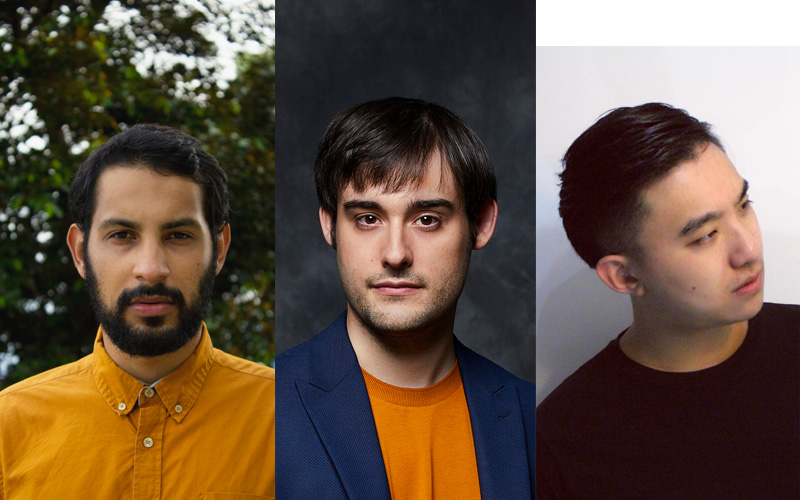In the Works 2022 composers Lyu, Migó, and Quiñones
by Kendall Grady
Burgeoning composers Wenbin Lyu (b. 1994), Marc Migó (b. 1993), and Christian Quiñones (b. 1996) hail from Liaoning, Barcelona, and Puerto Rico, respectively, but are currently based in Cincinnati, New York City, and Princeton. As Ph.D. music program candidates living, studying, working, and composing away from their homelands, Lyu, Migó, and Quiñones share wide-ranging insights into experience of relocation and the dynamic conceptions of self and other activated through dialectical relation.
There can be no inside without an outside, no familiar without the fantastic, no happiness without heartbreak, no haven without hazard–antipodal forces need one another in order to name themselves, and we need to encounter difference in order to better understand our own subject positions. This journey, however, is often as difficult as it is empowering, particularly for young people in new contexts. It is an experience that demands sitting with the liminal discomfort between those elements which we elect to define ourselves, and those elements which others attach to us. The world premieres of In the Works compositions by Lyu, Migó, and Quiñones trouble the resonances between self and other as an act of creation, producing novel experiences from archetypal–and sometimes painful–dichotomies.
For Lyu, this means exploring the space of growth between dormancy and maturity in the biological process of germination. For Migó, this means reimagining the reach of the Eastern European genre of the dumka to mourn political oppression and celebrate cross-cultural alliance. For Quiñones, this means conveying the encounter between personal identity and biased constructs. Taken together, these forerunners of new talent put the Cabrillo Festival of Contemporary Music’s In the Works concert—the culmination of the annual Conductors/Composers Workshop—to work amplifying the Cabrillo Festival as a site of multitudes.
Wenbin Lyu’s Germination (2022) for chamber orchestra is fertile ground for rethinking the dichotomy of East and West–a theme Lyu often attends by combining Western contemporary musical techniques with Eastern sensibilities by way of two recurring inspirations: nature and science. Like the process of germination itself, the body of Lyu’s orchestra is a budding seed, extending its tendrils–sometimes frantically, sometimes methodically–toward that which gives life: the orchestra’s individual members, their instruments, its conductor and audience, and all the sensations filling this biome. At one crucial point, the energetic frenzy of Germination wanes for piano, strings, and percussion to emerge in rhythmic unison across different registers, enunciating the forward march of life that is, lest we forget, also a dirge. In Chinese visual culture, plantlife is a renowned symbolic motif. Plum blossoms, for example, often represent spring–perseverance or purity. The chrysanthemum can represent longevity or wealth. Experiencing Germination, it is not difficult to feel oneself catching the current of a plum bough or beaming from a chrysanthemum stem, finding the unique beauty in the universal transformation from life to death.
Marc Migó’s Dumka for Anya (2022) for chamber orchestra offers a compelling ethnography of the private/public dichotomy by borrowing from the melancholy of different folk genres: lullaby, lament, and dumka. Adapted from the Ukrainian into multiple Slavic languages and popularized by Ukrainian composer and lecturer Mykola Lysenko in the late 19th century, dumka is a ruminative style of music that translates literally as “thought.” In Dumka for Anya, Migó thinks emotively through the technical elements of elegiac tone before breaking at the middle, according to his composition’s eponymous genre, into a state of turbulence. Migó is no stranger to thoughtful meditations that conjure different kinds of relationships between self and other, be it his dreamy Nocturne (2019) for violin, piano obbligato, harp, and strings or his pining Three Romances (2021) for violin and piano. Dumka for Anya honors Migó’s wife, Anya, as well as her homeland of Ukraine. In composing for his loved one and the love of persons, culture, and peace fractured by political upheaval in occupied Ukraine, Migó invites his audience to open their hearts to passions both near and far, intimate and social.
Christian Quiñones’ I’m everything that you think I am and everything that I am (2022) bears a title that says it all about refusing to say, or be, anything determinately. It frames a composition propelled by additions rather than omissions, abundance rather than foreclosure. In keeping with Quiñones’ repertoire including such titles as [INSERT CAPTION HERE] (2020) for auto-tuned mezzo-soprano, keyboard, and electronics, or Ad-lib (2021) for tenor saxophone, percussion, piano, and strings, I’m everything coyly wakes its audience up into the everyday chaos of our coexistence with others, but also with our past and future selves, with our inner voices, with all the people we become in different contexts, with the ever fluctuating summation of our beliefs, experiences, habituations, and desires. As at home with reggaeton as with a string quartet, Quiñones is deeply invested in confronting the moments in which vernacular and tradition, authenticity and stereotype, personal identity and cultural persona collide to (un)make us even more into who we think we are.
Mentored by Composition Faculty Stacy Garrop and Conducting Faculty Cristian Măcelaru and Octavio Más-Arocas, Lyu, Migó, and Quiñones share space in Santa Cruz for one brief but intense week away from the homes they have made elsewhere in the U.S. and the homes they bring with them from across the globe. These three young composers recast urgent dichotomies when the Cabrillo Festival Orchestra, led by six emerging conductors, perform three world premieres during the In the Works concert, Tuesday evening, July 26, 2022 at the Santa Cruz Civic Auditorium.

